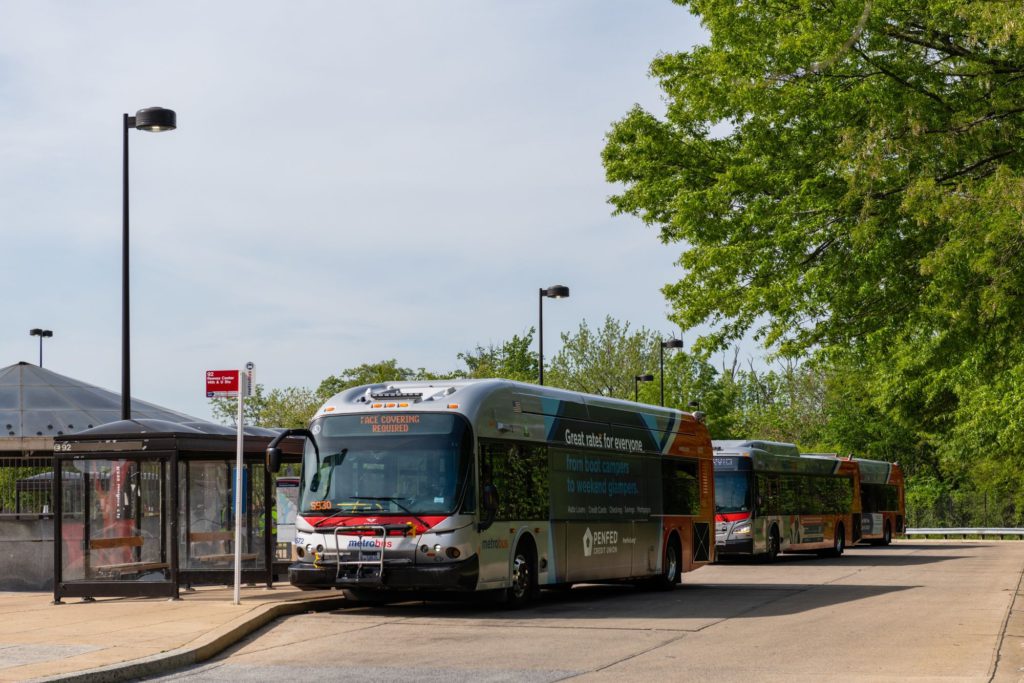The city council voted unanimously to eliminate fares on all buses within city limits.
(Bloomberg) — Washington, DC, is on its way to making buses free to all riders.
The District city council voted unanimously on Tuesday to eliminate fares on all buses within city limits. The bill also extends bus service overnight within DC, and would take effect as soon as July 2023 if Mayor Muriel Bowser either signs the bill or leaves it unsigned for 30 days. The bill would also be subject to a 30-day congressional review.
In the first year, the program will cost an estimated $32 million to make buses free and another $8.5 million to run them overnight. The bill also gives DC residents a $100 stipend for other modes of public transit that would go into effect by October 2024, and earmarks a total of $146.6 million over four years to fund the entire initiative.
Council Member Charles Allen, who sponsored the bill, said in a statement that the plan would “make a major difference in people’s lives almost immediately and reinvest those tax dollars right back in the monthly budget for families who depend on the bus.”
The move is part of a broader push for free or reduced-fare transit seen in the US and around the world as cities try to reduce automobile emissions, boost equity and lure more workers back to the office. Several US cities lifted bus fares in the early months of the Covid-19 pandemic, but costs have since resumed. In March, Boston began piloting a program to make three bus routes that were heavily used by lower-income riders free through February 2024. In June, the city of Tucson, Arizona, voted to make its public transit free to all riders through the year, and Kansas City, Missouri, has offered no-cost public transit service since 2019. Meanwhile, New York City’s Metropolitan Transportation Authority may boost fares on subways, buses and commuter rail lines by 5.5% next year.
“I think we’re going to see that other cities are going to see what we’re doing and recognize the advantages of this,” DC City Council Chair Phil Mendelson said at a Dec. 1 press conference.
Commuter Benefits
DC Mayor Muriel Bowser has expressed concern over the free-bus plan in a letter addressed to City Council members. “District residents and taxpayers will have to pay for this program,” she wrote. “Our neighbors, Virginia and Maryland, should absorb some of these costs as their residents will benefit from this program as well.”
The capital’s transit system is anchored by the six lines of the Metrorail subway network, whose fares provide most of the passenger revenue collected by the Washington Metropolitan Area Transit Authority. Metrobus passenger revenue totaled $124 million in fiscal year 2019, the last year before fares were disrupted due to the pandemic. That accounts for 18% of passenger revenue. The budget report showed that 7% of the revenue that WMATA used for operations came from bus fares. State and local assistance contributed the bulk of operating funds.
Eliminating bus fares would help commuters, advocates for the bill say. DC already requires businesses with 20 or more employees to provide commuter benefits if their workers are primarily located within the city. That benefit doesn’t reach everyone: Residents who take the bus are half as likely as those who take Metrorail to have an employer subsidy, according to a report from the city council’s Office of the Budget Director. White adult residents are also twice as likely to get the subsidy as their Black counterparts in the city.
Economic Boost
Allen said eliminating fares would contribute to the city’s economic recovery. He hopes it will inspire more riders to take the bus and to attend late-night events and gatherings without worrying about how they’ll get home. (Metrorail trains stop running at midnight during the week and 1 a.m. on weekends.)
The bill also sets aside $10 million annually to improve bus lanes and infrastructure. The funding is critical because it will bolster routes that have been chronically neglected and increase bus reliability and frequency, Allen said.
“If that thing I give you for free doesn’t actually connect you to any services, connect you to work to school or actually do a thing of value, I really haven’t given you anything,” he said.
More stories like this are available on bloomberg.com
©2022 Bloomberg L.P.










